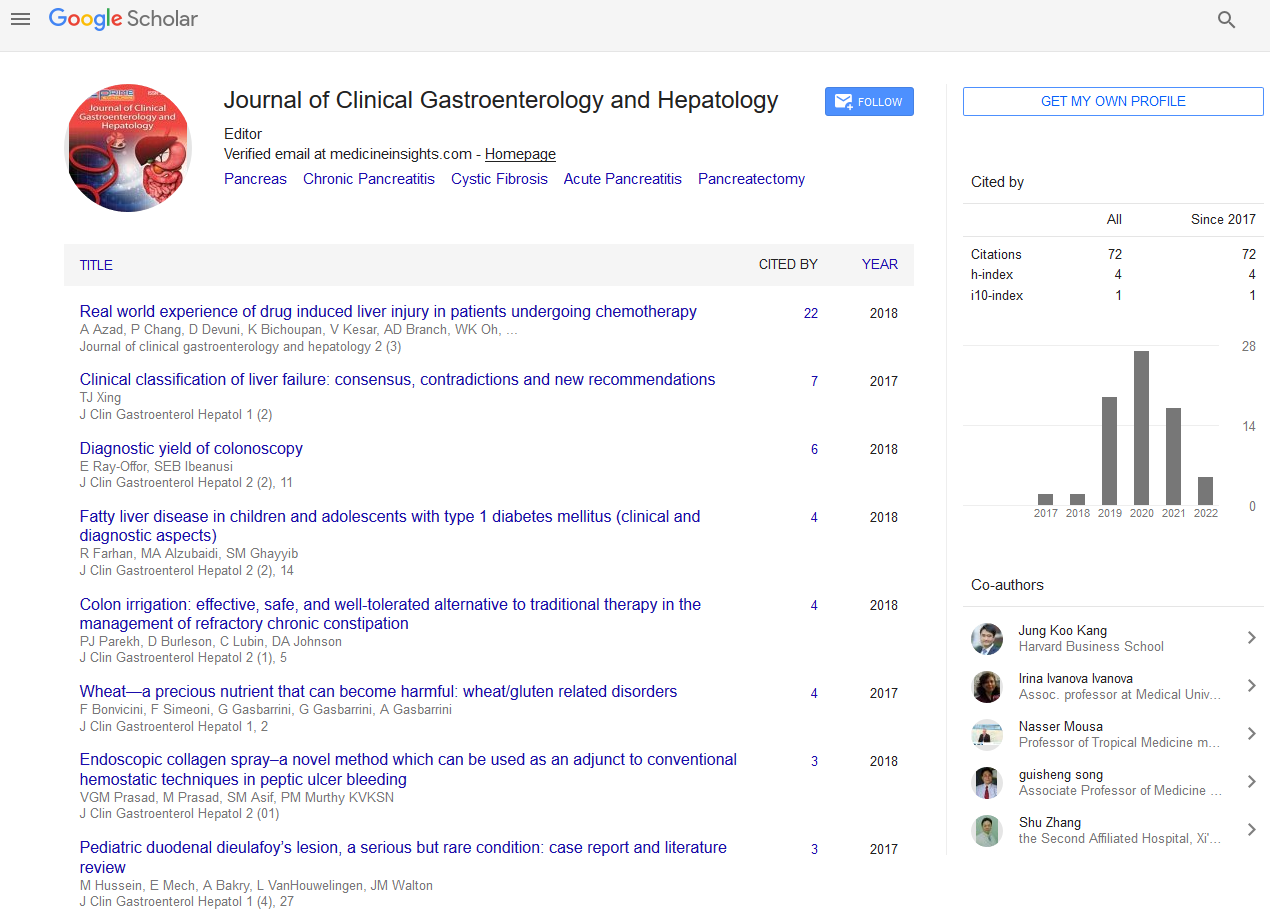Commentary - (2024) Volume 8, Issue 6
Chronic Inflammatory Diseases: The Burden on Healthcare Systems and Society
Uwe Christian*
Department of Endoscopy, Santa Chiara Hospital, Italy
*Correspondence:
Uwe Christian,
Department of Endoscopy, Santa Chiara Hospital,
Italy,
Email:
Received: 02-Dec-2024, Manuscript No. IPJCGH-25-22567;
Editor assigned: 04-Dec-2024, Pre QC No. IPJCGH-25-22567 (PQ);
Reviewed: 18-Dec-2024, QC No. IPJCGH-25-22567;
Revised: 23-Dec-2024, Manuscript No. IPJCGH-25-22567 (R);
Published:
30-Dec-2024, DOI: 10.36648/2575-7733.8.6.53
Description
Inflammatory diseases encompass a broad spectrum of
disorders characterized by immune system dysfunction,
leading to persistent inflammation in various organs and
tissues. Inflammation is a vital biological response to infection
or injury, but when it becomes chronic, it can contribute to
severe health conditions. This article explores the causes,
types, and management of inflammatory diseases, highlighting
their impact on human health. Inflammation is a protective
mechanism triggered by the immune system in response to
harmful stimuli such as pathogens, damaged cells, or toxins.
It involves the activation of immune cells, the release of
inflammatory mediators, and increased blood flow to the
affected area. While acute inflammation is short-lived and
beneficial, chronic inflammation can lead to tissue damage and
disease progression. The immune system mistakenly attacks
the bodyâ??s own tissues, as seen in conditions like rheumatoid
arthritis and lupus. Bacterial, viral, and fungal infections can
trigger prolonged immune responses, leading to chronic
inflammation. Exposure to pollutants, allergens, and toxins
can provoke inflammatory reactions. Some individuals inherit
genetic variations that increase susceptibility to inflammatory
diseases. Poor diet, lack of exercise, smoking, and chronic
stress contribute to systemic inflammation. A chronic condition
causing joint inflammation, pain, and deformity. A multisystem
autoimmune disorder that affects the skin, kidneys, heart, and
other organs. An inflammatory disease affecting the central
nervous system, leading to neurological impairments. An
autoimmune attack on insulin-producing pancreatic cells. A
chronic inflammation of the gastrointestinal tract, affecting
any part from the mouth to the anus. Involves inflammation
and ulcers in the colon and rectum. Characterized by airway
inflammation leading to breathing difficulties. Persistent
inflammation of the lungs causing airflow obstruction.
Chronic inflammation in blood vessels leading to plaque
buildup and increased risk of heart disease. Inflammation
of the heart muscle, often triggered by viral infections.
Chronic neuroinflammation contributes to cognitive decline.
Inflammatory processes play a role in neuronal degeneration.
An autoimmune condition causing rapid skin cell turnover,
leading to scaly patches. Chronic inflammation resulting
in itchy, red skin. The diagnosis of inflammatory diseases
typically involves. Assessing symptoms, family history, and risk
factors. Measuring markers like C-reactive protein, Erythrocyte
Sedimentation Rate (ESR), and specific antibodies. X-rays, MRIs,
and CT scans help visualize tissue damage. Tissue samples
confirm inflammation and rule out malignancies. Treatment
for inflammatory diseases aims to reduce inflammation,
manage symptoms, and prevent complications. Reduce pain
and inflammation (e.g., ibuprofen, aspirin). Suppress immune
response and inflammation (e.g., prednisone). Slow disease
progression in autoimmune conditions (e.g., methotrexate,
hydroxychloroquine). Target specific immune pathways (e.g.,
TNF inhibitors for RA and IBD). Treat infections that contribute
to inflammation. Anti-inflammatory diets rich in fruits,
vegetables, whole grains, and omega-3 fatty acids help reduce
inflammation. Targeting specific genetic pathways to regulate
immune function.
Acknowledgement
None.
Conflict Of Interest
The authorâ??s declared that they have no conflict of interest.
Citation: Christian U (2024) Chronic Inflammatory Diseases: The Burden on Healthcare Systems and Society. J Clin Gastroenterol Hepatol. 8:53.
Copyright: © 2024 Christian U. This is an open-access article distributed under the terms of the Creative Commons Attribution License, which permits unrestricted use, distribution, and reproduction in any medium, provided the original author and source are credited.

